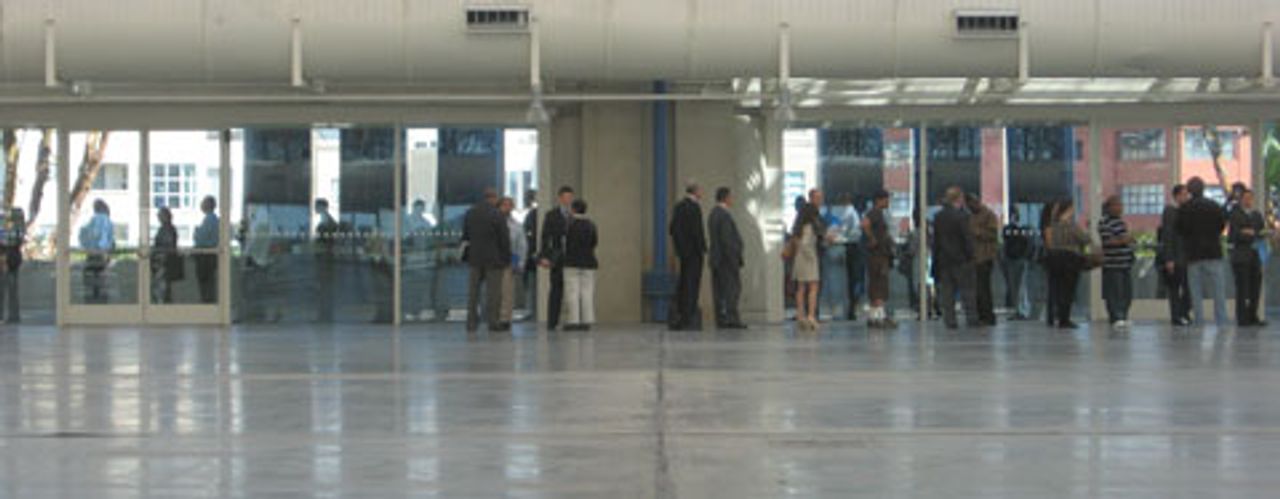
An estimated 1,200 to 1,500 workers showed up for a national career fair at the San Diego Convention Center last Friday morning. With a line extending as far as four football fields, several hundred other workers showed up but decided to leave due to concerns they would be unable to get into the fair within the four-hour time period allotted for interviews. Workers of all ages and skill-sets attended the fair, looking for jobs in a variety of fields.
The career fair itself offered very little in terms of actual jobs—of the 27 booths slotted for attendance, several had not even bothered to show up, according to people leaving the auditorium. The organizations that did attend were largely centered in areas of law enforcement, border patrol and finance.
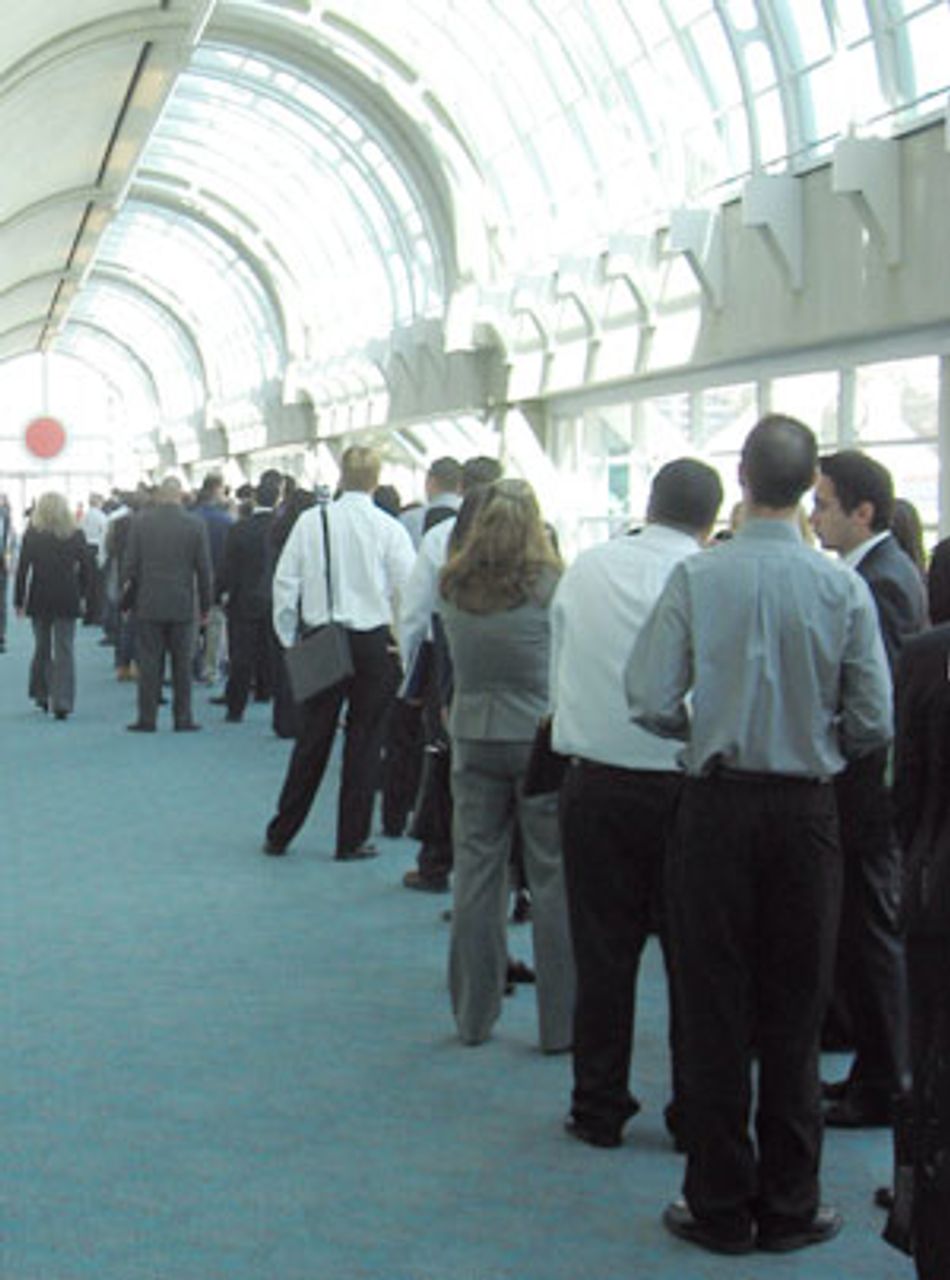 Workers lining up last Friday for the jobs fair at the
Workers lining up last Friday for the jobs fair at theSan Diego Convention Center
The working class in San Diego faces increasingly difficult conditions, highlighted by rising unemployment, which currently stands around 8.5 percent and is expected to rise significantly. Property values have plummeted. More than half of the homes in the working-class neighborhood of Encanto, for instance, are currently "underwater," with homeowners owing more on their properties than they are worth.
City residents are also facing the gutting of public education from kindergarten through college, and a variety of other retrograde cuts in social spending as determined by the recent California budget as well as by City Hall. (See "California's new budget and the social crisis in San Diego").
Reporters from the World Socialist Web Site interviewed several unemployed and underemployed workers about the social conditions they face in San Diego. Common themes emerged among all age groups and backgrounds: the long, tireless search for work with no results; the inability to meet basic living needs and housing costs; worries about families and their future; frustration with the greed of the ruling elite; and the willingness to work at any kind of job in any field but not being able to get a chance.
Sue Roberts, a worker with a long career history as an executive assistant in various industries, has exhausted every avenue she can think of in her search for a job. She was laid off in October 2008 from the job where she had worked for eight years. After a brief stint at another company, she was again laid off in December and has been unemployed since. This is the third job fair she has attended in three months. She turns in applications every day, has had some interviews, but says there are "just so many people out there looking for jobs" she cannot even get a response. "To make matters worse, companies are holding off on hiring" until they see what the economy will do, she said.
With all the problems she and people she knows are facing, Roberts expressed doubt over any help coming from the Obama administration. A close friend of hers just recently lost her house. With so much competition for jobs, companies are paying less for the same work, as much as $25,000 a year less, according to Roberts. She asked, "How will the stimulus package help? Give us an extra month, at most?"
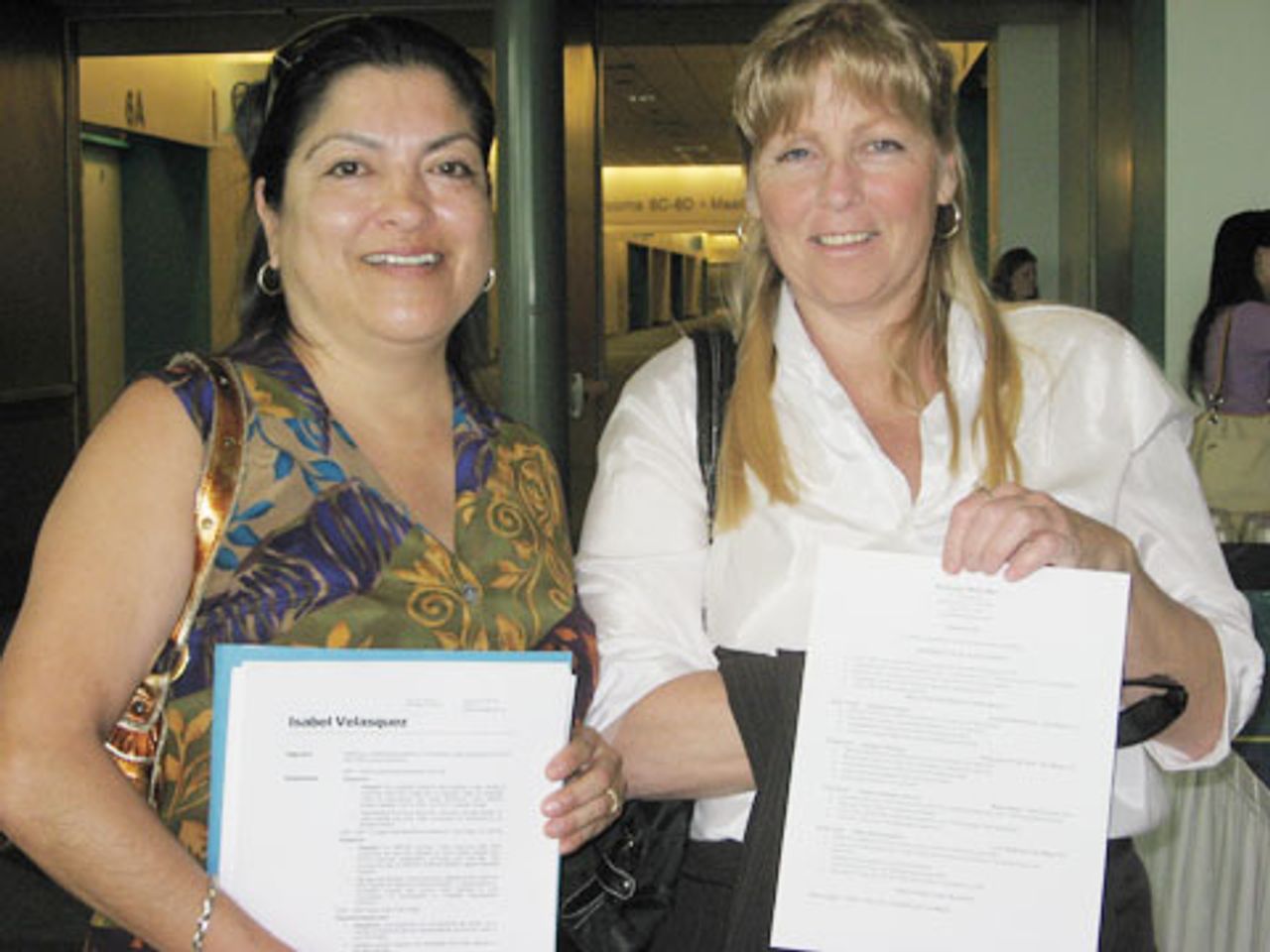 Isabel Velasquez and Suzanne Melycher
Isabel Velasquez and Suzanne MelycherSuzanne Melycher was laid off in October after having been with Goodwill for a year and 10 months. Isabel Velasquez lost her job when the company she worked for was bought out. The two women are friends who now have the full-time job of looking for work. They, like so many others we interviewed, are also at their third job fair in three months. "We have been going to the career center and turning in at least five to eight applications a day," said Velasquez, as Melycher added—"a day"—to emphasize the regularity and dedication with which they approach their job search.
"People like me and her, as well as other people, we've been working for, you know, over 30 years. We have experience and references and we can't find a job," says Melycher. About the job fair, Velasquez said, "I think it's targeted more for young people. It's police, border patrol recruiters from health care, military. And the border patrol won't hire you if you're over 40." Neither was optimistic about the prospects for actually finding a job at this event, yet they dutifully showed up and waited in line for hours. What else was one to do in this kind of job market?
Standing next to them was 22-year-old Garland Brown, a father of two who had recently been laid off from his position as a box-loader with Kay Bee Toys. He expressed similar frustration with diminishing job prospects, despite his best efforts to find work, and is worried about his ability to make rent in the coming months. "We are $250 short this month," he said. "I have two kids, and I might lose my apartment."
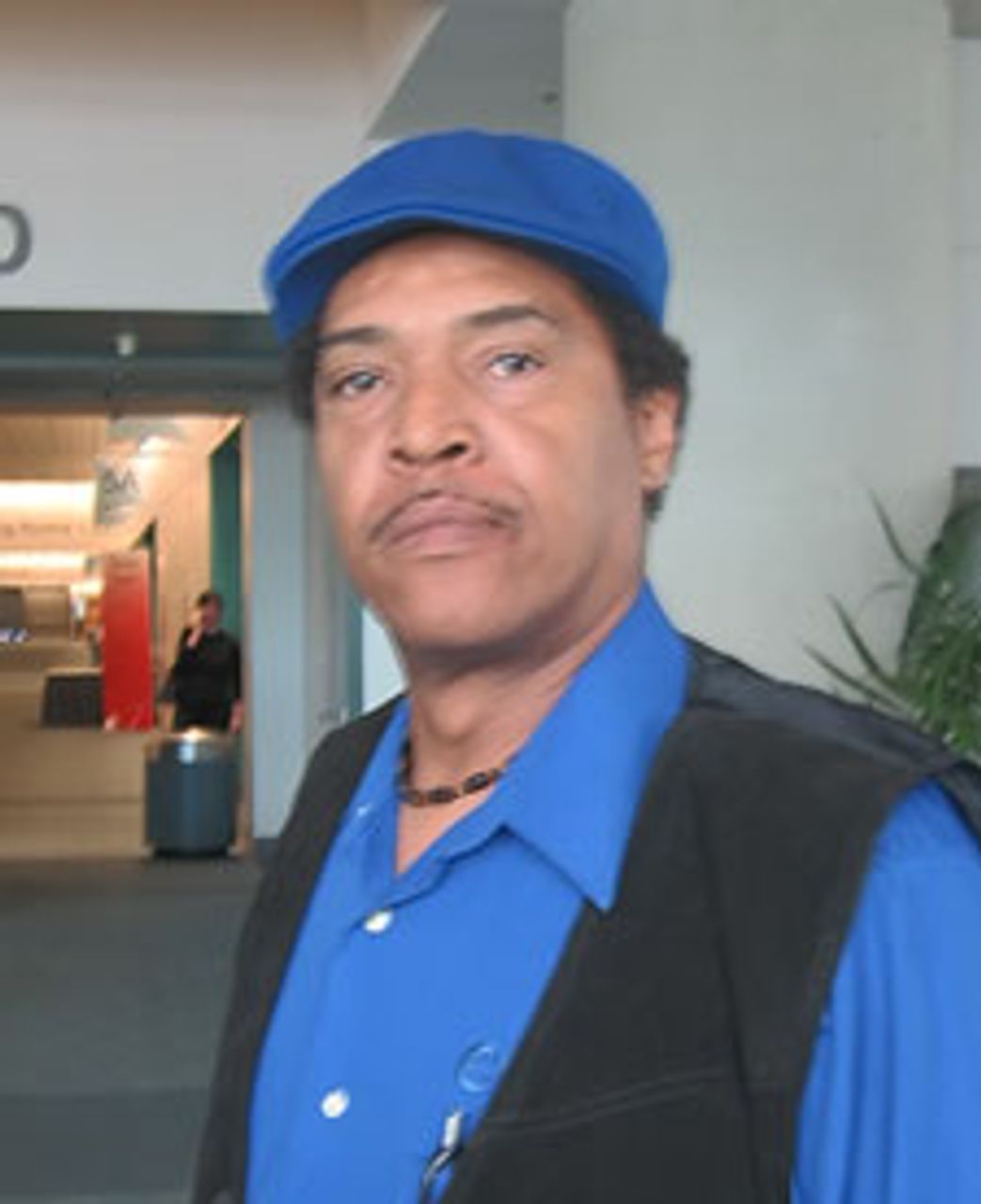 Herbert Bennet
Herbert BennetHerbert Bennett, a 52-year-old Navy veteran, has been out of work for two years. He sporadically works construction "under the table" because, "It's better to have money coming in than no money at all. Your children don't need to have the best of things, but they'll have something ... and you still have your dignity having a job."
He went on to criticize what he sees as America's culture of greed. "Americans are greedy, okay. They want it all. I mean, with all the money and wealth we have and we do not share with one another."
But Bennett went on to clarify that he thought it was the wealthy elite who were responsible for the present situation. When asked by WSWS reporters what he saw as the precipitating cause of the current crisis, he responded: "Greed by the upper class. Those are the ones that are getting the money right now. They're just sitting back on their money waiting to reinvest when things get better. These are the giant executives giving themselves 200 or 300 million dollar bonuses. Come on!"
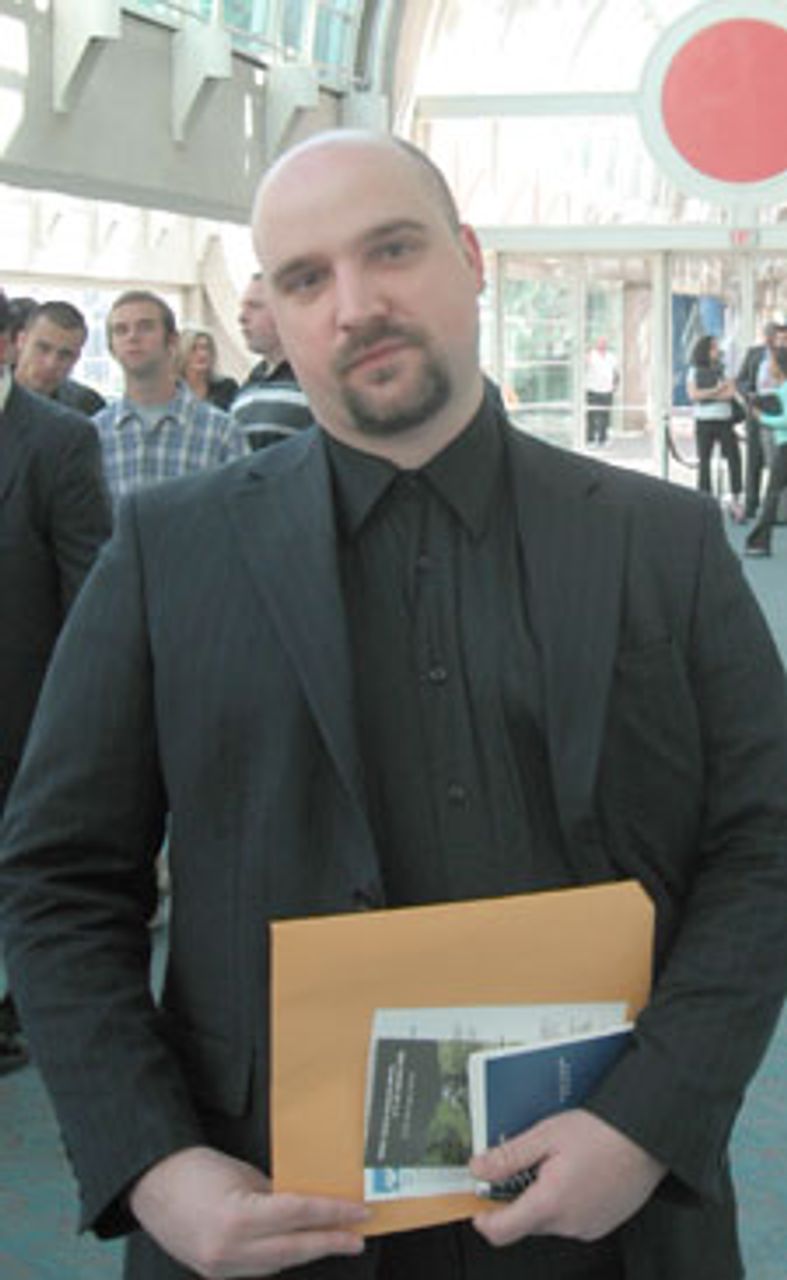 Peter Gulyas
Peter GulyasPeter Gulyas, a Hungarian immigrant we spoke with as he was leaving the fair, best summarized the overall sentiment among those in attendance. Gulyas, who has attended three job fairs already this year, said this one was different from the others because there were "more people, but less jobs."
The growing lines of job searchers in San Diego and other cities increasingly remind one of the long queues of unemployed workers during the Great Depression. One of the most egregious contradictions of the capitalist system is that millions of working people are without jobs even as the needs of society requiring their energy, labor and skills are growing every day.
